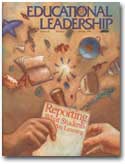We teachers know what we like—and like what we know. In the lounge, the English teacher hunkers down in his corner with coffee and the latest novel. In the cafeteria, the science teacher traces the path of bodies falling through the air of her imagination while she eats her salami sandwich.
We limit ourselves. If you think of those who have made especially important or interesting contributions to their field of study, you will notice a common thread: they draw from the whole world in order to better understand that part of the world they have chosen to focus on. In so doing, they broaden their vision, and sometimes see that all things are interconnected.
I began to realize this myself while reading Surely You Must Be Joking, Mr. Feynman! Adventures of a Curious Character (Bantam Books, 1989), one of a pair of informal memoirs by the Nobel Prize-winning physicist Richard Phillips Feynman. Among other university experiences Feynman described was the unofficial seating plan in the dining commons, consisting of the physics table, the philosophy table, the literature table.
It occurred to Feynman one day that after hours of concentrating on physics, it was tiresome to talk about the subject again over dinner. So in a sort of movable feast, Feynman began eating elsewhere—one week at the philosophy table, another at the literature table, and so on. He quickly discovered that similar conversations were taking place at all the tables, but the way the diners approached the questions, the language they used, gave him new insight into questions that he, as a physicist, was struggling to answer.
Sojourns into other fields inspire me to open my eyes more fully to the possibilities around me, to realize the extent to which my particular crops—literature and writing—live and grow in other fields. And so it is with all the subjects we teach. Our challenge is twofold: to push ourselves to look elsewhere, especially to those areas we love—sports, woodworking, gardening—for connections with what we teach; and to push our students to do the same.
An essay by Joyce Carol Oates on boxing, for example, or the psychological writings of Oliver Sacks (Awakenings, for example) are rich sources of insight. Stories by Italian novelist Italo Calvino should be required reading for all math and science students. And what about music? It permeates the lives of students like nothing else.
Consider the lessons in the careers of jazz musicians Ornette Coleman and Charles Mingus. Coleman got his hands on a saxophone when he was about 10. Having no musical training nor access to any, he set about teaching himself to play by learning the musical scales, which, he assumed somewhat logically, were ABCDEFG. Only after learning them this way and developing his playing style around it did he discover the traditional progression.
Mingus, a dictatorial genius, would bring his musicians together in his famous workshops, where they would create. He rode them mercilessly, pushing them for more, for better, for best. If they hated Mingus for his manner, they grew to love him for what he saw in them, and what eventually he got them to find in themselves: a newer, fuller music that continues to amaze.
So in the coming year, risk a brief vacation from your normal domain. Check out what is going on in film. Try reading the Tao Te Ching, or Stephen Mitchell's The Gospel According to Jesus (HarperCollins, 1991); both of these books are deep meditations on teaching. Or look to such excellent business writers as Peter Drucker or Tom Peters to get yourself thinking about change, organization, systems. You will find yourself marveling at the order of our world and will almost certainly see things in a new way.
It is this insight—into our subjects, into ourselves, into the world around us—that is the true goal of our teaching, or should be. Such insight brings with it a deeper understanding of the relationships among all things, and offers us a heartier, more varied and (usually) delicious fare than we could find by foraging only in our own field.





